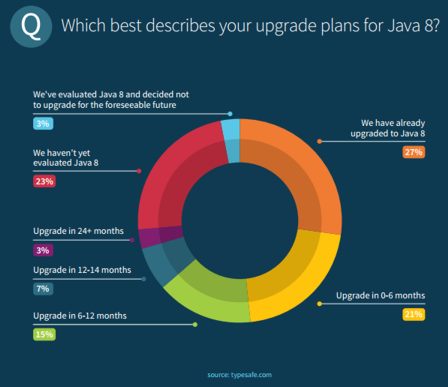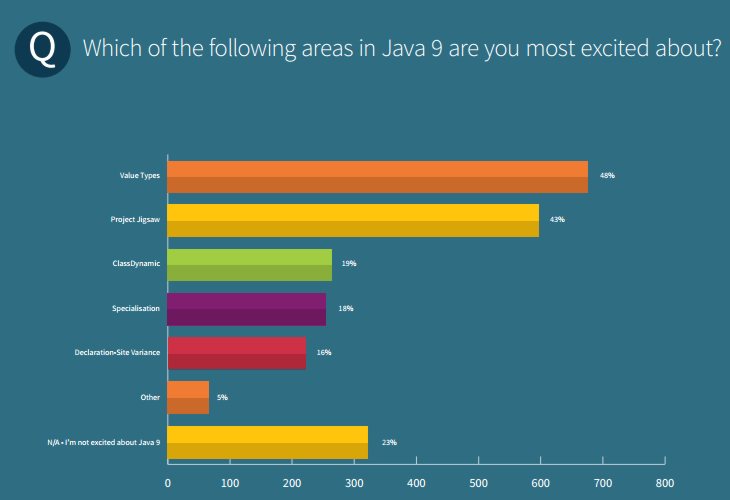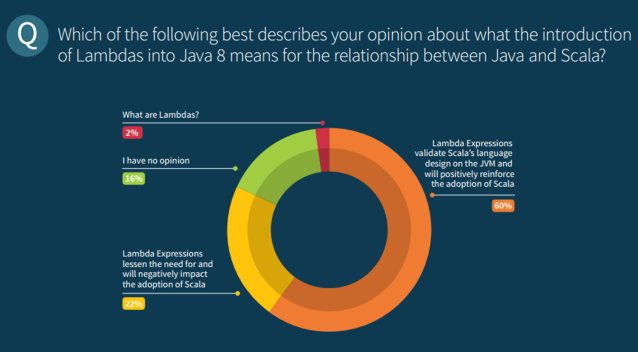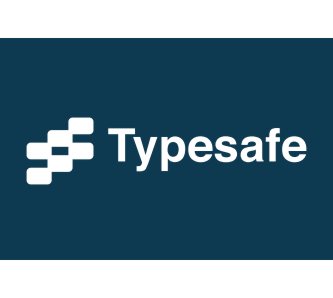| Survey Indicates Fast Take Up Of Java 8 |
| Written by Janet Swift |
| Thursday, 23 October 2014 |
|
Survey findings suggest Java 8 take up is faster than expected and developers are already starting to think about Java 9. The global survey, which was conducted online by Typesafe, elicited over 3,000 responses. It was a follow up to similar research just prior to the launch of Java 8 when 2,800 developers responded. The results of the earlier survey indicated that two-thirds of Java developers planned to upgrade within two years, which represented quick take up of a new Java release. The second survey reveals an even faster adoption rate. As indicated in this chart over a quarter of respondents had already upgrade and a further 36% plan to upgrade within the next year.
Typesafe refers to companies that don't plan to upgrade to Java 8 within the next twelve months as "Holdouts" and presents this information about them: Of Java 8 holdouts, 69% are running Java 7, and 26% are running Java 6. For the majority of the Java 8 holdouts, their decision has nothing to do with Java 8 and more to do with how their businesses operate: 37% cited their non adoption being related to hurdles with legacy infrastructure; 31% cited scarcity of resources / time, 19% cited organization obstacles / red tape; and only 19% cited specific concerns with Java 8. Java users have traditionally been fairly slow to upgrade to a new version. However, the response to the survey's question about plans for Java 9 reveal that, among "Adopters", i.e. those who have already moved to Java 8 or plan to within the next 12 months, only 8% have zero interest in Java 9, with 28% having strong interest, 32% having average interest and 32% having mild interest. The two Java 9 features which developers find most attractive are value types (48%) and Project Jigsaw (43%), something that was originally planned for Java 7 and was then shelved again in order to hasten the release of Java 8.
Lambda expressions were arguably the most important feature introduced in Java 8 and 80% of Typesafe's Java 8 adopters cited "lambda expressions and virtual extension models" among the features they were most excited about. Looking into this further, Typesafe found that 45% were already using Java 8's Lambda features and another 51% were exploring them with only 4% choosing the "What are Lambdas?" option in response to the question, "Which best describes your use of Lambdas in Java 8?" Given that Typesafe is the organization responsible for Scala, the previous question was building up to a series about how Java 8 impacts respondents perceptions of Scala. The survey found that 68% of those using Lambdas were now more interested in exploring other functional languages with similar capabilities. In answer to "Which best describes your organization's interest in Functional Programming? only 4% chose "what is Functional Programming?" while 47% of these respondents claimed to be using fuctional programming already and the rest (49%) were "exploring" it.
The culmination of this part of the survey was a question that confronted the issue of the relationship between Java and Scala now that Java 8 has introduced Lambdas. Sixty percent chose the option "Lambda Expressions validate Scala's language design on the JVM and will positively reinforce the adoption of Scala" whereas only 22% chose "Lambda Expressions lessen the need for and will negatively impact the adoption of Scala".
More Information
Related ArticlesJava 8 Launched With Supporting Line-Up JDK 9 Early Access Now Available Lambda Calculus For Programmers To be informed about new articles on I Programmer, install the I Programmer Toolbar, subscribe to the RSS feed, follow us on, Twitter, Facebook, Google+ or Linkedin, or sign up for our weekly newsletter.
Comments
or email your comment to: comments@i-programmer.info
|
| Last Updated ( Friday, 24 October 2014 ) |





